An overview of who offers you the best of goodies for an e-business.
When you’ve got an E-business we all have an important question that tickles our mind, “ Which Cloud platform to go for? ” Well, it is pretty obvious that we always want the best, and we know there are so many cloud platforms available in the market.
Few of the leading ones are listed below:
Now that it is clear AWS and Google Cloud Platform are THE most popular cloud computing platforms.
Let's just clear this huge confusion by comparing the 2 GIANTS from the base.
We’ll break the comparison into simple modules:
In today’s digital-first world, choosing the perfect cloud platform can directly affect your e-business strategy. Two tech titans—Amazon Web Services in cloud computing and Google Cloud—continue to dominate the space. But when it comes to making a decision, the question normally comes up: Which platform provides better flexibility, pricing, and performance?
In this Cloud service providers comparison, we’ll break down the main features of AWS vs Google Cloud to help you make a thoughtful decision customized for your business requirements.
Amazon Web Services (AWS) is a subsidiary of Amazon, which was launched to provide on-demand cloud computing services to businesses and individuals back in 2006.
Similarly, Google Cloud , a part of Google, is a suite of cloud computing services offered to businesses and individuals, which was launched 2 years later in 2008.
Principally, both are the most trending platforms right now many popular brands utilizing them.
A few of them are listed below:
|
AWS |
Google Cloud |
|
1. Netflix 2. Times Inc. 3. NASA 4. Expedia 5. Airbnb 6. Lamborghini |
1. HTC 2. Leadpages 3. Heathrow 4. Coca-Cola 5. Evernote 6. Sony Music |
We’ll know both Google Cloud and AWS are big players in their own right.
Let’s dig deeper and see what Gartner analyses:
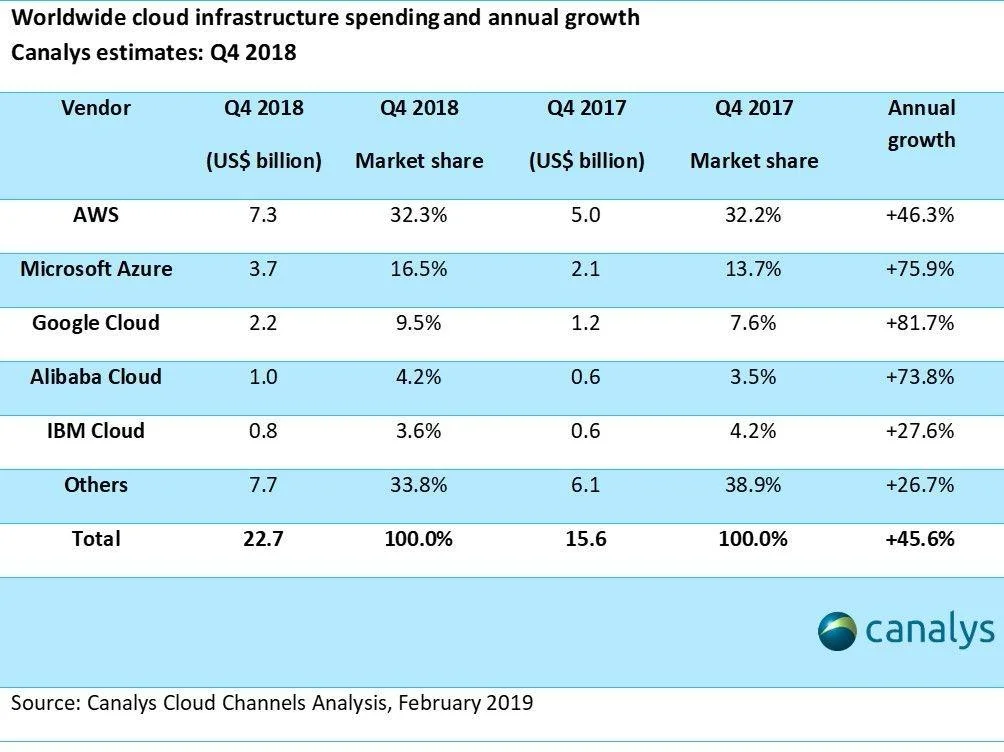
Source: Canalys
Now, let's have a close look at the market share of AWS and other major players:
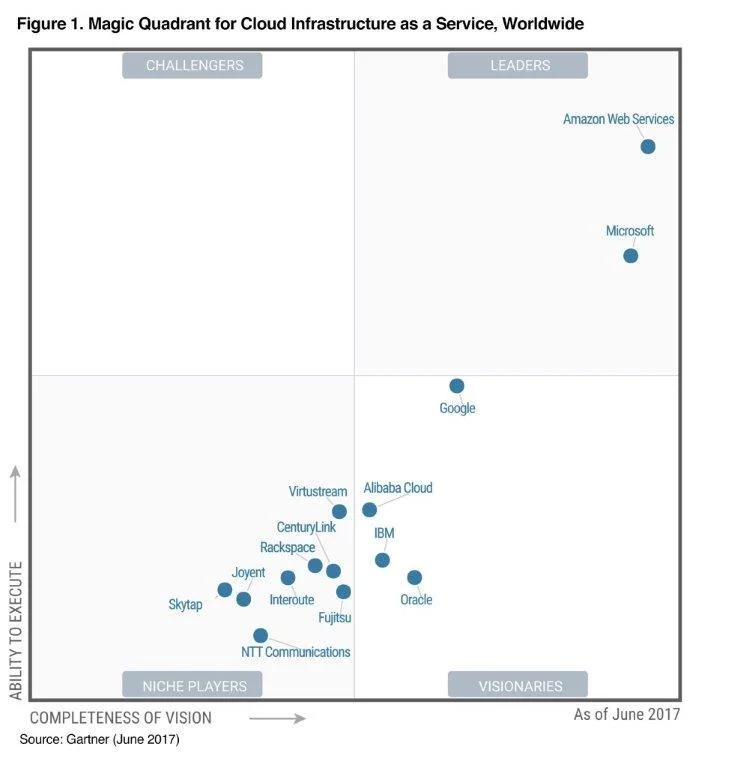
Source: Gartner
AWS is winning markets since the last few years, while other players, including Google Cloud, started gaining traction off late.
Well, we cannot decide on-basis of few standalone statistics. Many will agree that AWS is one of the oldest players in the game, but Google Cloud is no less than a game changer here.
Google Cloud is relatively new in the market but it may soon catch up and disrupt the industry like anything.
Let’s look at how both platforms compare across major cloud computing services:
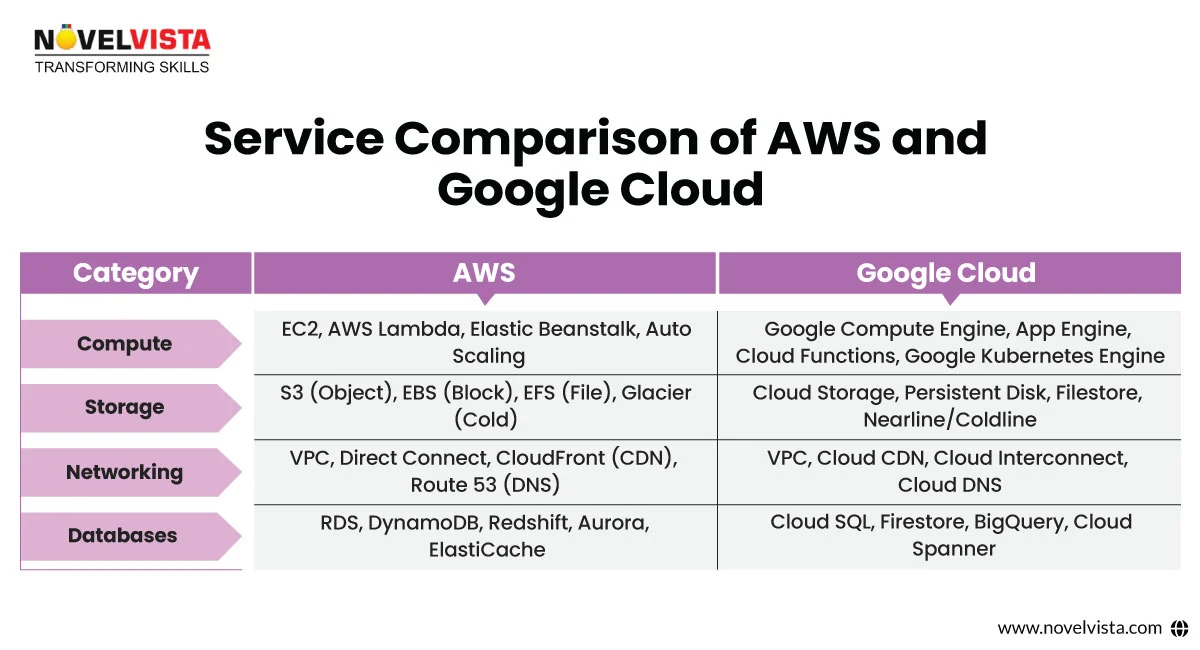
Having knowledge about the pricing in the Google Cloud vs AWS battle can be difficult. Here's a simple breakdown:
Take a look at the AWS Pricing to know more about it.
For startups and small teams, Google Cloud’s pricing structure is normally more budget-friendly, while AWS provides flexibility for large-scale systems.
| AWS | Google Cloud |
|
1. Compute Salient Features: 1. Secure |
1. Compute 1. Compute engine Salient Features: 1. Support for both machine types - custom and predefined |
|
2. Storage 1. Simple Storage Service (S3) - object storage |
2. Storage
2. Cloud Spanner for enterprise standard relational data storage |
|
3. AWS Machine Learning and AI tools |
3. Google Machine Learning and AI tools |
Scalability and dependability start with a strong support. Here’s how the two big players rank:
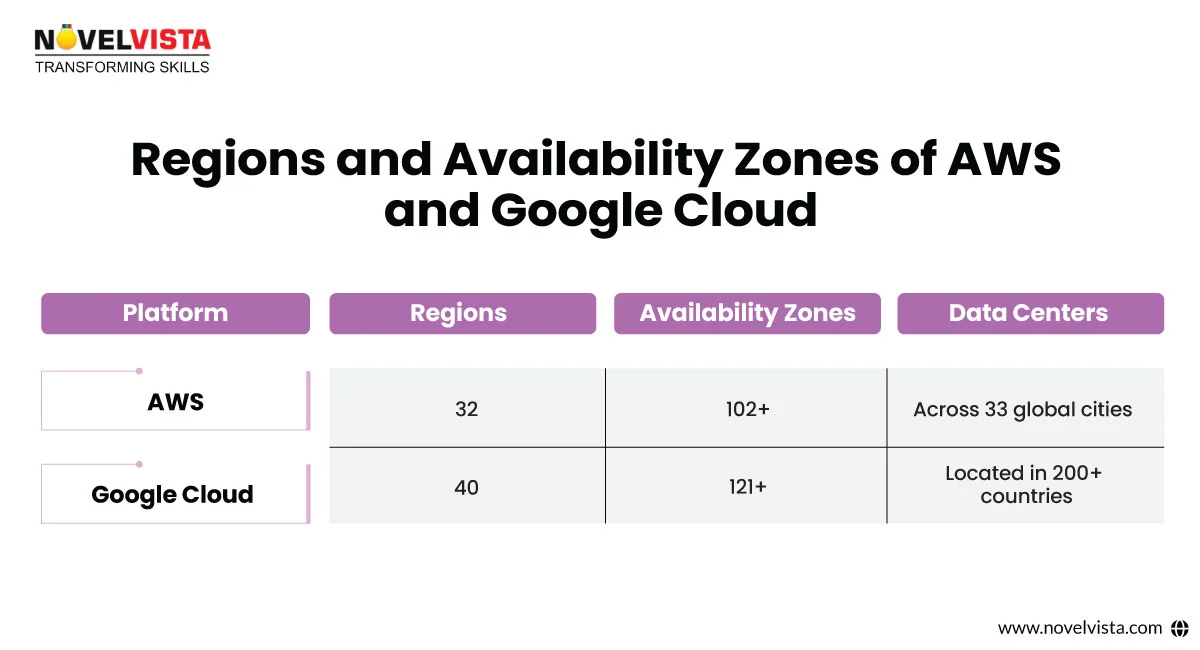
AWS holds a slight edge in global presence, but Google Cloud has been expanding rapidly with high-performance, eco-friendly data centers powered by renewable energy.
In the AWS vs Azure vs Google Cloud debate, security remains a key distinguishing feature. Both platforms take it seriously, providing strong security and compliance features.
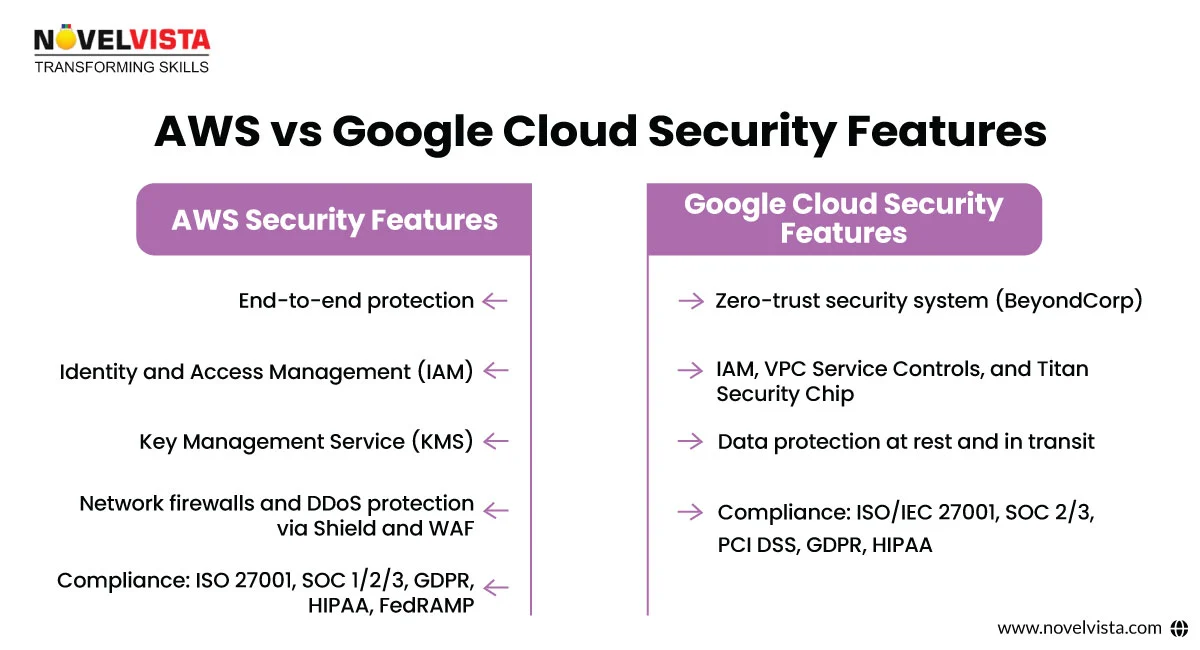
Both cloud providers provide tools to observe, audit, and protect your tasks. However, Google Cloud progress further with continuity and low energy usage in its security-focused system.
Ease of use can make or break your cloud journey.
In terms of user experience, Google Cloud shines for beginners and developers focused on AI/ML. AWS, meanwhile, is the go-to for enterprise-grade workloads.
It is high and particularly challenging to understand. AWS offers a cost calculator with multiple variables associated with it, which makes estimation difficult.
Google offers a customer-friendly pricing tier, which means they beat the base over other competitors. They offer huge discounts along with flexible contracts to take down the competitors. Moreover, they charge on an actual usage basis (per-minute basis).
Both AWS & Google Cloud are extremely powerful cloud computing platforms. Both are efficient, reliable and perfect for large scale computing. If you’re running a data management business then nothing like these, as both AWS and Google Cloud offer wide range of enterprise-grade products and services. AWS offers around 200+ products while Google Cloud offers around 80+ products.
When we talk about an e-business, it’s never-ending - CMS, eCommerce, social media, and the list goes on. So which one is a winner, when it comes to comparing Google Cloud vs. AWS? Well, we’d say that both are perfectly imperfect in a retro style.
When it comes to reliability and speed, AWS is definitely one you want to check out! AWS of course also has a long-standing history of providing cloud computing services for businesses and enterprises over the past decade.
They really were the first ones to push the cloud industry forward, and are still the one that providers like Google and Azure are copying. Their support, redundancy, and availability as per different regions is credible.
There are many other products and services and a wide range of features from Google Cloud and AWS which couldn't be covered in this post. Whichever provides utility to your business, it's your preferred vendor.
When it comes to Google Cloud vs AWS, both platforms provide exceptional capabilities in the cloud ecosystem. AWS remains the industry standard with an unmatched variety of services and deep global reach. Google Cloud, on the other hand, is catching up with AI-ready tools, sustainable systems, and aggressive pricing models.
Your choice in the AWS vs Google Cloud debate should depend on your business priorities:
Need mature enterprise solutions and global infrastructure? Go with AWS.
Want cost-effective, AI-powered services and better documentation? Try Google Cloud.
And if you're still not sure, have a look at the AWS Certified Solutions Architect Associate Certification to gain in-depth practical knowledge of AWS capabilities.
For those who want to take a closer look at multi-cloud methods, you might also want to explore Microsoft Azure and see how it compares in the wider AWS vs Azure vs Google Cloud spectrum.
Ready to start your cloud journey with expert training and guidance? Explore training and certification programs with NovelVista and unlock your cloud potential today!
Start your journey with the AWS Solutions Architect Associate course and build real-world skills that put you ahead of the competition.
Confused about our certifications?
Let Our Advisor Guide You